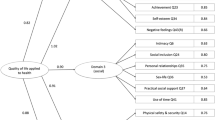Abstract
The purpose of this study was to develop the Korean version of World Health Organization Quality of Life study assessment instrument (WHOQOL) and WHOQOL-BREF, an abbreviated version of WHOQOL and to identify contributing factors in the quality of life of Koreans. The WHOQOL and WHOQOL-BREF were translated into colloquial Korean according to instructions of the WHOQOL study group. Then the Korean questionnaire was applied to 538 subjects, composed of 171 medical patients and 367 healthy subjects who volunteered to rate the scale. Finally, 486 subjects completed the rating. Collected data were analyzed statistically. The Korean version of WHOQOL and WHOQOL-BREF domain scores demonstrated good test–retest reliability, internal consistency, criterion validity, content validity and discriminant validity. The physical, psychological, social and environmental domains made a significant contribution to explaining the variance in the quality of life while the independence and spiritual domains made a lesser contribution. The domain scores produced by the WHOQOL-BREF correlated highly with the WHOQOL. The physical health domain contributed most in overall quality of life, while the social domain made the least contribution. These results suggest that the Korean version of WHOQOL and WHOQOL-BREF are valid and reliable in the assessment of quality of life and that physical domain is contributing most and social and spiritual factors are contributing least to the quality of life in Koreans.
Similar content being viewed by others
Reference
World Health Organization. WHOQOL Study Protocol. WHO(MNH/PSF/93.9). Geneva: WHO, 1993.
Orley J, Kuyken W. Quality of life assessment: International perspectives. Heidelberg: Springer Verlag, 1994.
The WHOQOL group. Development of the WHOQOL: Rationale and current status. Int J Mental Health 1994; 23: 24-35.
Szabo S on behalf of the WHOQOL group. The World Health Organization Quality of Life (WHOQOL) assessment instrument. In: Spilker A (ed.) Quality of Life and Pharmaconomics in Clinical Trials, 2nd ed., Philadelphia and New York: Kippincott-Raven Publishers, 1996; 355-362.
World Health Organization. Introduction and Background Field Trial WHOQOL-100, February 1995, MNH/PSF/95.1A. Geneva: WHO, 1995.
World Health Organization. Facet Definition and Questions. Field Trial WHOQOL-100, February 1995, MNH/ PSF/95.1B. Geneva: WHO, 1995.
Berwick DM, Murphy JM, Goldman PA, Ware JE, Barsky AJ, Weinstein MC. Performance on a five-item mental health screening test. Medical Care 1991; 29: 169-176.
The WHOQOL group. Development of the World Health Organization WHOQOL-BREF Quality of Life Assessment. Psychological Medicine 1998; 28: 551-558.
World Health Organization. Preparation and Administration of Questionnaire. Field Trial WHOQOL-100 February 1995, MNH/PSF/95.1C. Geneva: WHO, 1995.
World Health Organization. The 100 Questions with Response Scales. Field Trial WHOQOL-100 February 1995, MNH/PSF/95.1D. Geneva: WHO, 1995.
World Health Organization. Importance Questions. Field Trial WHOQOL-100 February 1995, MNH/PSF/95.1E. Geneva: WHO, 1995.
World Health Organization. Scoring the WHOQOL. Field Trial WHOQOL-100 February 1995, MNH/PSF/95.1F. Geneva: WHO, 1995.
Leung KF, Tay M, Cheng SS, Lin F. Hong Kong Chinese Version World Health Organization Quality of Life Measure. Hong Kong: Hong Kong Hospital Authority, 1997; 27-36.
The WHOQOL group. The world health organization quality of life assessment (WHOQOL): Development and general psychometric properties. Soc Sci Med 1998; 46: 1569-1585.
World Health Organization. The origins of the 100 Questions. Field Trial WHOQOL-100 February 1995, MNH/ PSF/95.1G. Geneva: WHO, 1995.
Belter PM, Wu EJC. EQS for Windows User's Guide. Encino, Multivariate Software Inc, 1995.
Author information
Authors and Affiliations
Corresponding author
Rights and permissions
About this article
Cite this article
Min, S., Kim, K., Lee, C. et al. Development of the Korean versions of WHO Quality of Life scale and WHOQOL-BREF. Qual Life Res 11, 593–600 (2002). https://doi.org/10.1023/A:1016351406336
Issue Date:
DOI: https://doi.org/10.1023/A:1016351406336



